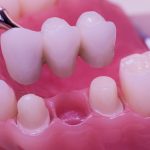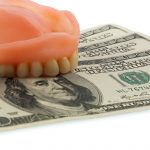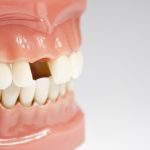Dentures: Evaluate the Restorative Procedure and its Costs
Medically Reviewed by: Dr. Robert A. Milner

On this page: Preparation & placement | Final dentures | Dentures care | Cost | Find a dentist | En Español
Complete dentures are used to replace missing teeth for people with no remaining teeth. They may also be used for people who have lost several teeth. In this case, the appliance is called a partial or overdenture.
Tooth loss may result from periodontal disease (gum disease), tooth decay, or traumatic injury. It is very important to replace missing teeth. The ill effects of not doing so can be a shift in remaining teeth, an inability to bite and chew properly, as well as a sagging facial appearance, which makes one appear older than they are.
The beauty of today’s dentures is that they are designed to be comfortable and functional. They are very similar in appearance to natural teeth and can improve a smile or facial appearance.
Denture Preparation and Placement
During the first dental visit to evaluate the need for dentures, your dentist will examine your gums and supporting bone structure to identify the appropriate treatment plan.
In some cases, oral surgery is performed to correct bony ridges that may interfere with the stability of the denture. In other cases, the remaining teeth may need to be extracted before placement. Once your dentist has decided that dentures are right for you, he will make an impression of the gums to identify every ridge and crevice to ensure the best fit possible.
In cases where teeth need to be removed, an immediate denture is typically placed to enable proper healing of the extraction sites and serve as an esthetic replacement for natural teeth. This can be easily modified for changing ridge contours during healing until final dentures can be made. In constructing the immediate dentures, dentists will use a shade and mold chart to choose replacement teeth that will most closely match your natural teeth, minimizing any changes in appearance.
Placing the Final Dentures
Complete dentures are made when gums are restored to a healthy condition and sufficient time has passed for healing. Complete dentures replace all teeth in the upper or lower jaws of the mouth. Gums will naturally shrink through the healing process of tooth loss, which normally takes from six to 12 months. During this period, the immediate dentures may require adjustments to accommodate the changes in the gums and underlying bone structure. This could include soft and hard relining procedures.
An overdenture is a removable dental prosthesis that covers and rests on one or more remaining tooth roots. A removable partial denture is a dental prosthesis that replaces some teeth and is built around existing natural teeth. Both the overdenture and the removable partial denture may be connected to the remaining tooth roots or remaining natural teeth with anchors made of metal or plastic. These connections improve stability and the retention of both prostheses.
Complete dentures, overdentures, and removable partial dentures should be removed at night while you sleep. This enables the gums to be bathed by saliva, which has important properties for controlling the naturally occurring flora found in the oral cavity. Saliva aids in maintaining a healthy mouth.
Denture Care: Adapting to Your New Smile
It is extremely important to practice healthy dental hygiene when wearing dentures. There is an increased risk of developing a more serious medical condition should oral irritation result from improper dental hygiene. These conditions include, but are not limited to, periodontal disease, leukoplakia (thickened white, potentially precancerous patches on the mucous membranes, also called smoker’s tongue) and fungal (denture stomatitis) infections.
The gums, tongue and palate should be brushed with a soft bristle brush every evening when the dentures are removed, and each day before you insert them to stimulate the gums and remove plaque accumulation. When removing dentures at night, brush them carefully to remove any loose debris and plaque then soak them in a cleansing solution. Your dentist will be able to recommend one. Some people keep theirs in an ultrasonic cleaner, but keep in mind that an ultrasonic cleaner doesn’t replace brushing. When cleaning your dentures, place a towel beneath them or clean them over a sink filled with water to avoid breakage.
You should see your dentist 24 hours after delivery of your new dentures. It is not unusual to experience some initial discomfort. Minor adjustments can increase comfort and eliminate problems before they become more serious. Initially, a new denture may feel unusual in the mouth. The cheeks, lips, and tongue are very sensitive areas that require time to adjust. It is common to bite one’s cheek or tongue while acclimating to the new restoration. However, persistent soreness or irritation should be reported to your dentist.
In addition to adjusting to the feel of new dentures, it will also take some practice learning to chew with them. Begin by slowly chewing on very small pieces of soft food, using both sides of the mouth simultaneously. As your comfort and confidence increase you can progress to larger pieces of soft food and then proceed to harder foods.
Speaking may also require practice. It may be difficult to pronounce certain words. Usually, this problem is overcome within two weeks. New denture wearers can adjust more quickly to their new prosthesis by practicing reading aloud.
With a well-fitting denture and practice, adhesives may not be necessary. Wearers should expect the lower denture to fit somewhat loosely. They may need to learn how to use the muscles of the cheeks and tongue to keep it in place. Although this might sound bothersome, with practice, it becomes second nature.
Readjustment or Replacement
If your dentures fit poorly, cause persistent mouth irritation, chip, crack, or break, it is important to see your dentist. Although most gum remodeling occurs within the first year, changes in gums and bone continue throughout one’s lifetime. Over time this may result in ill-fitting or loose dentures and may compromise facial appearance.
In addition, movement of the dentures on the gums may cause significant irritation. For this reason, it is recommended that complete dentures be remade or at least relined every five to seven years.
What Do They Cost?
Complete dentures can range in price from $1,000 to $8,000. The difference in cost is related to the fabrication time, cost of materials, and the experience of the dentist. An experienced dentist may take 15 hours and five to six appointments to complete the process of making complete dentures.
The cost range does not include fees associated with possible oral surgery or tooth extraction. Depending on the type of dental insurance you have, insurance companies may offer a 15 percent reimbursement or up to a 50 percent absorption of the total procedure costs.
Factors that may impact the cost of your dentures include:
- The possible requirement of an additional procedure such as extractions of remaining teeth or oral surgery to refine bony ridges.
- A prosthodontist specializes in crafting dentures and may charge more for his services.
- The location of the dentist.
- The type of dental insurance you have.
- The complexity.
- Dental materials selected by the patient and the dentist. For example, highly cross-linked polymer denture teeth are more esthetic and do not wear as much as conventional plastic teeth and are more expensive. There are different metals that can be used in removable partial dentures that may also increase the cost.
- The type of warranty offered. Some warranties may be for one to two years, while others may run up to 10 years.
If treatment is not covered by your insurance policy, or if you don’t have insurance, you may be able to enlist the services of a third-party financing company like CareCredit or Capital One. Qualified candidates can work with a financing company to develop a monthly payment plan that best fits their budget.
Selecting The Right Dentist
It is important to inquire about the dentist’s training and experience when investigating the denture procedure. Although many general dentists offer the treatment, prosthodontists receive three years of advanced training in restorative dentistry. As a result they may be a better or more experienced option for you to consider when it comes to dentures or an alternative like implants or bridges. The American College of Prosthodontists offers additional resource information about the training of prosthodontists in the U.S.
About the Reviewer

Dr. Robert A. Milner is a cosmetic and restorative dentist serving Mission Viejo, CA since 1991 at his private practice, Dentistry For Your Smile. His expertise spans an array of popular treatments including dental implants, full mouth reconstruction, smile makeover, teeth whitening and more. He also works closely with a team of distinguished specialists to cater to a full range of services, including popular orthodontic treatments like Invisalign.
Dr. Milner received his Doctor of Dental Surgery Degree from the Marquette University School of Dentistry, where he graduated head of his class, followed by a two year associateship in Southern California. He is a member of the American Dental Association, the California Dental Association, the Academy of Oral Medicine, the American Academy of Implant Dentistry, and the American Academy of Cosmetic Dentistry.






